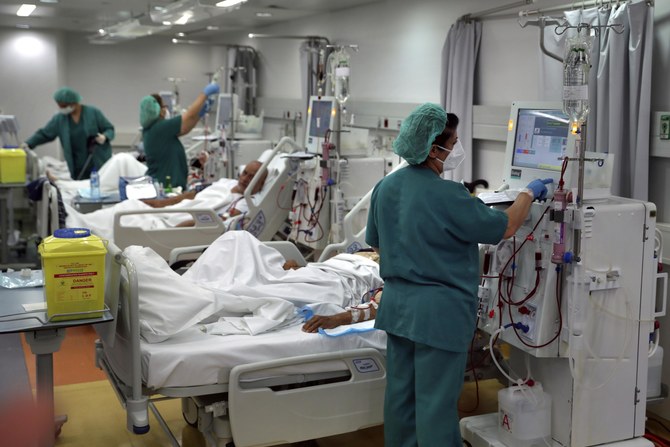DUBAI: Dr. Samer Saade’s car ran out of fuel this morning while he was on his way to work at Hammoud Hospital University Medical Center in Sidon, southern Lebanon.
He parked his car on the side of the road in Khaldeh and took a cab for the remainder of the 30-km journey.
“I haven’t been able to fill my car for the past four days,” Saade told Arab News. “Either queue lines at gas stations are out of this world or the pumps are simply closed,” he said.
The emergency room physician, like practically all Lebanese, has been hit hard by the ongoing fuel shortage in the crisis-hit country.
Giant queues clogging roads near petrol stations have become a common sight and refueling is limited to 15 or 20 liters, making long-distance travel a thing of the past.
The fuel crisis, however, is not only limited to the petrol needed for cars; it has also made its way to the country’s beleaguered electricity grid.
Lebanon’s hospitals were already struggling to cope with the coronavirus disease (COVID-19) pandemic before the latest electricity crisis.
Now, doctors say, they are being stretched even further with shortages of medical supplies and fuel.
“Medicine shortages, equipment shortages, hyperinflation pricing out the poor from getting care — anything that can go wrong in this country will go wrong, basically,” Saade said.
At the hospital, state electricity “barely comes on for two or three hours per day,” Saade said, with four private generators needed to fill the gap.
Two of Lebanon’s Turkish power barges have been shut down amid an ongoing feud with the parent company, while the other four state-owned power plants are running on fumes.
“We were already used to state electricity being out, but now we don’t even know if we’ll manage to secure enough fuel for the generators,” Saade told Arab News.
In total, his hospital has four generators that operate, with two operating at any given time.
According to Saade, his hospital has enough fuel reserves for the upcoming four days.
“After that, I don’t know. We’re living day-by-day,” he said.
Forty km away at Rafik Hariri University Hospital in Beirut, an establishment that found itself at the frontlines of the pandemic, the situation is even more precarious.
As prolonged electricity cuts surged, the hospital has been rationing electricity since yesterday and turning off air-conditioning in all areas except those used for medical purposes, the hospital’s general manager Firas Abiad wrote in a tweet.
“Air-conditioning throughout our premises except in areas needed for medical purposes, such as operating and examination rooms will be turned off due to protracted electricity cuts,” Abiad said.
Accompanying his tweet was a letter Abiad sent to caretaker Energy Minister Raymond Ghajar asking for support in maintaining the hospital’s electricity supply.
If the problem persists, “we’re headed toward a catastrophe,” Saade said.
“Ventilators, CPR machines, basically everything needed for critical care facilities will be shut down,” he added.
Lebanon has been without a fully functioning government for eight months, with negotiations stalled in a quagmire that has seen politicians bicker over cabinet portfolios and quotas.
Meanwhile, food insecurity and extreme poverty plague the country as any semblance of normal life dissipates.
Several industries have sounded the alarm over a lack of fuel, which has caused private generators to struggle to keep pace with increased state outages.
The head of the Lebanese poultry syndicate urged officials over the weekend to deliver diesel to chicken farms before power cuts compromise the wellbeing of livestock and the safety and quality of refrigerated chicken.
Meanwhile, the crisis is also jeopardizing public sector operations.
The General Security headquarters in Beirut, the country’s main intelligence agency, was hit with a blackout yesterday when a generator shutdown coincided with a state power cut.
Despite Lebanon needing to preserve its last remaining foreign currency reserves for any possible economic recovery, the central bank has continued to subsidize fuel, medicine and wheat, draining the state’s coffers of some $5 billion annually.
But the cash-strapped small Mediterranean country has now begun rolling back its subsidy program, starting with fuel.
Lebanon will now start importing fuel at LL3,900 to the dollar, as opposed to the official rate of LL1,500. On the black market, the Lebanese pound is trading at around LL18,000 per greenback, representing a depreciation of around 92 percent for the national currency.
Effective today, a price hike of around 30 to 40 percent on all fuel derivatives has been implemented.
The price of 20 liters of gas will now cost LL61,000 ($40 at the official rate), up from LL45,200, while 20 liters of diesel will cost LL46,100, up from LL33,300.
“These price increases will surely affect our ability to secure fuel while also increasing our costs and, as a result, the cost on patients,” Dr. Mohammed Khodrin, head of Akkar Governmental Hospital, told Arab News.

























